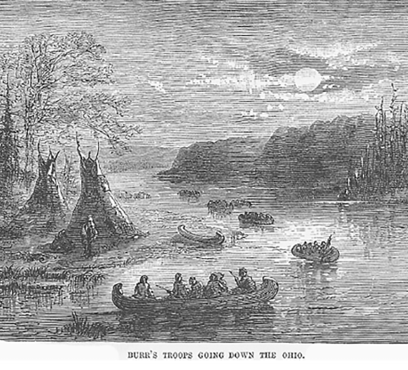The Christmas present of the congressional January 6 Committee is a report that the White House administration of Donald Trump, in its final months, opted for an official policy of lawlessness and sedition. Not only was there a conspiracy to overturn a presidential election, but the conspirators intentionally violated numerous federal laws in order to do it, including laws against interference with the workings of Congress and laws against the incitement of violent mobs.
Enabling this would-be coup d’etat, various agencies including the Pentagon and the FBI, failed to timely act against the conspiracy, essentially because they failed to conceive it could be happening. This is an advantage that criminals have over the bureaucratic state. The quotidian expectation of adherence to law leaves law-abiding citizens open to victimization by flagrantly law-breaking politicians. It should not have been a surprise when the golfer announced his new run for the presidency on the platform of chucking the Constitution.
Pundits call it unprecedented. But the great state of Ohio screams: “Hold my beer!” Ohio has experience with flagrantly law-breaking politicians, and we can school fellow Americans on how to deal with it. Or not.
First there was the Aaron Burr incident. Burr arrived in May of 1805 on Blennerhassett Island, an island between Ohio and Virginia (no West Virginia), then privately owned by the eccentric Irish lawyer Harman Blennerhassett, a prototype of the right-wing donor class who had turned the island into a Mar-a-lago-like country club and fortress.
Burr, as the sitting vice president, had already shot and killed Alexander Hamilton in a duel in 1804, and subsequently was forced to resign from the Senate and from the vice presidency. On Blennerhassett, Burr and his patron hatched a plot to foment secession of the western U.S. territories, including Ohio and the lands of the Louisiana Purchase, in order to establish a kingdom ruled by Burr and called the District of Burr. After establishing a military command post on Blennerhassett, by 1806, Burr had contracted for boats and provisions to support an invasion of Louisiana and Mexico with a force of 7,000 men.
_______________________________________________________________________________
“Law is whatever is boldly asserted and plausibly maintained.”
– Aaron Burr
_______________________________________________________________________________
To accomplish his plot, Burr visited William Lytle, an Ohio bankroller and a colonel in the Ohio Militia. Burr also met with Ohio’s two U.S. Senators, Thomas Worthington and John Smith (same name as the current special prosecutor), in order to recruit them. Worthington, a loyal ally of President Thomas Jefferson, told Burr to go to hell, or maybe to Louisiana. (Worthington may have been a chief informant, alerting Jefferson to the Burr plot.) Smith was more ambiguous, and his ambiguity caused his expulsion from the Senate as a suspected Burr collaborator in 1808, though he was never convicted of a crime. If that seems implausible, remember that in antiquity, plotting insurrection had actual political consequences; hard to imagine now, I know. Perhaps Smith raised a fist as he ran from the Capitol grounds.
In November of 1806, President Jefferson publicly announced the Burr-Blennerhassett scheme and called for Burr’s arrest. Jefferson’s opponents called it a witch hunt. In December, the Ohio militia seized eleven of Burr’s commissioned boats on the Ohio River and prepared to raid Blennerhassett Island. In 1807, Burr was apprehended and taken into custody in Alabama. He was tried in Virginia for treason and for “conspiring to invade a nation at peace with the United States,” but due to Chief Justice Marshall, who presided over the case as it was the first treason trial, Burr was acquitted on politicized technical grounds. He left for Europe and lived in obscurity until 1836. The trial had at least foiled his plot and undermined his political support.
In Pike County, Ohio, there is an idyllic little historic estate called Friendly Grove. The name is wordplay because the first lady of the estate was the heiress Friendly Sumner, known for her habitual unfriendliness. The unfriendly Friendly was second wife of a politician named Robert Lucas, destined to become the governor of two different states, Ohio and Iowa. (Lucasville is named for his brother.)
The Lucas brothers were brought up to be plantation masters. Their father was born a Pennsylvania Quaker, but he moved to Virginia, where he could purchase black slaves. After moving with slaves to Ohio, when southern Ohio was still a territory of Virginia, Robert Lucas organized and commanded a militia brigade in preparation for another war with Britain, but in 1808, after pursuing a band of Indians accused of having stolen horses, he shirked from attacking the Indians, which resulted in a charge of cowardice by one of his men. Lucas challenged the man who had called him a coward to a duel, but Lucas failed to appear for the duel, perhaps due to a flare-up of bone spurs.
Nonetheless, Lucas found a way to achieve notoriety. The incident as summarized by Ohio historian Henry Howe is worth quoting at length:
“In 1810 a girl of the neighborhood [Portsmouth in Scioto County] laid a child to his [Lucas’s] charge and called upon him to pay damages. This he declined to do, and a process was procured to take him to jail. When the sheriff attempted to serve the process he resisted and would not be taken. Thereupon, rather than endanger his life, the sheriff resigned, and his duties devolved upon the coroner, Maj. Munn, whom Lucas had previously challenged to fight a duel.
“Maj. Munn failed to arrest Lucas, and he also resigned. Then Lucas threatened to kill the clerk who had issued the writ, and he resigned.
“Upon this a call was made for county officers who could and would enforce the laws and arrest him. A young school teacher, John R. Turner, of Alexandria, came forward and said he would issue a writ if made clerk. Elijah Glover said, ‘Make me sheriff, and by G-d I’ll take Gen. Lucas to jail, or any other man.’
“They were appointed, the writ was issued, and when Glover showed the writ to Lucas, he quietly submitted and went to jail. But Squire Brown, father-in-law of Lucas, interfered to prevent the arrest, when Nathan Glover, a brother of the sheriff, picked him [Brown] up and threw him into a clump of jimson weed, and told him to lie there and keep quiet or he might get into trouble. He lay there and kept quiet.”
To clarify, Lucas had just married his first wife, Margaret or Elizabeth Brown (sources differ on her name), who was not the pregnant “girl” who had confronted Lucas with public paternity charges, which Lucas then evaded, making him subject to arrest. (Again I must inform readers of the shocking fact that, in antiquity, prominent politicians could be put in jail for evading charges of paternity.) Wife Brown, whatever her name, whose father at last report was in the patch of jimson weed, died in 1811, they say of “consumption,” but public shame may have played a role.
Most interesting is that Henry Howe was the only historian willing to give the gory details. Both of Lucas’s biographers omit details of the incident in order to glorify Lucas, in the manner that the Proud Boys extol their Trumpian hero. J.W. Johnson refers to the scandal without mention of the pregnancy, as a case of Lucas being an “impulsive young man,” exemplary of the American pioneering spirit. Biographer John Parish was even more exculpatory, gushing about Robert Lucas that it “was but natural that he should have been in the days of his early manhood one whose rugged self-assertion had in it more than a tinge of recklessness.” Thus is the exploitation of women counted for political credit as “rugged self-assertion.” Grab ‘em by the pussy and all that.
Once Lucas was in jail, as Parish continued: “The situation was an interesting one—a refractory militia-man defying the laws, and seemingly no one with courage enough to execute them.” The circumstances were altogether similar to those that would cause many in the Trump administration to fear taking action against the powerful chief executive, according to the J6 Committee. But then the question was how Lucas would get out of jail. Parish again: “Lucas, lodged in jail, was restless, and the militia seemed to offer a loophole for escape.” Would he? No, that would be too audacious. Unthinkable that an American politician and military man would actually order his troops to break him out of a civilian jail on American soil.
Parish again: “To various officers he wrote letters or orders, looking toward a forcible release of their unfortunate commander.” And now a quote from one of those letters, to a militia Captain, dated Sept. 15, 1810:
“You are requested to attind at Portsmouth immediately, armed and as many of your neighbors as are willing to support the Constitution, as the revolutionist party has, by violence fourced me into prison.”
He could have added: “will be wild.” On the outside were written the names of five men with the label: “The dam raskels that mobbed me.” So there we have it, the precedent for January 6, 2021, complete with vile Trumpian insults. A military officer invoked a fake Constitutional claim to overturn civil law, with the hopes of imposing martial law. Though Lucas’s hoped-for jail-break did not happen, he was released after paying penalties, and went on to play a key role in American national politics.
______________________________________________________________________________
“You are requested to attind at Portsmouth immediately, armed and as many of your neighbors as are willing to support the Constitution, as the revolutionist party has, by violence fourced me into prison.”
– Robert Lucas, 1810
______________________________________________________________________________
But the rumor that Lucas was not morally up to his rank followed him into the War of 1812, when the unit he commanded was immediately surrendered to the British enemy at Detroit. (Lucas’s journal on the surrender became chief evidence used in the court-martial of General Hull.) By the time Lucas was back in action, the war was over, without Lucas having seen the combat needed to feed his political career.
Despite or because of his Heisman Trophy performance in Portsmouth, Lucas managed to get himself elected to the State Senate in 1814. Only men could vote at that time, and having infamously escaped paternity charges made him a hero among a certain class of ole’ Ohio boys. His Senate position helped him land the Friendly heiress as his second wife in 1818. She went along as Lucas became Andrew Jackson’s chief representative in Ohio, which even then had crucial Electoral College votes.
Andrew Jackson was the linchpin connecting the lawless politicians of what was then the west. Jackson had been governor of Tennessee throughout the Burr conspiracy, had hosted Burr numerous times at the Hermitage, and had been a chief contractor building boats to support the Burr invasion plan, though insufficient evidence came to light to prove that Jackson had known of Burr’s intentions. Jackson attended Burr’s trial, and Jackson was a chief detractor of Jefferson, claiming that Jefferson’s prosecution of Burr looked more like “political persecution.” After his acquittal, Burr continued to boost Jackson’s political ambitions, calling Jackson “my friend,” and helping Jackson achieve the presidency in the election of 1828, two years after Jefferson died.
The Jackson connection gave Robert Lucas two gigs in 1832, when Jackson headed the Democratic ticket for reelection to the presidency. On that ticket, Robert Lucas was elected Ohio’s twelfth governor. That year he also served as chairman and president of the first Democratic National Convention, establishing the Democrats as the pro-slavery party, nonetheless with support from Ohio.
As governor, Lucas continued his Trumpian commitment to lawlessness. A dispute erupted in 1835, when Michigan petitioned for statehood, claiming a strip of ambiguous territory that included Toledo and the lower Maumee Valley – gateway to the “Great Black Swamp” – as its own. After only trivial attempts at negotiation, Lucas personally led a force of 600 Ohio militiamen to the disputed boundary line, announcing war with Michigan. This prompted the Michigan territorial governor to do likewise, actions in express violation of the Articles of Confederation and Article I, Section 10, of the Constitution. But oh, I forget, a Florida man has now nullified the Constitution. The Michigan militia attacked a group of Ohio surveyors as they attempted to establish a new boundary line, which was nearly the only bloodshed in the “Toledo War.”
______________________________________________________________________________
“I live my life as I deem appropriate and fitting. I offer no apologies, no explanations. I hate them.”
– Aaron Burr
_____________________________________________________________________________
Lucas then took a page from the future playbook of Vladimir Putin by conducting a sham plebiscite in the disputed territory, a poll boycotted by the Michiganders, and at the same time Lucas named the Toledo strip after himself, Lucas County, a name that it retains to this day. I’m only surprised that Lucas did not build a shoddy casino palace and golf resort in Toledo, decorated in faux gold and also bearing his name.
President Jackson attempted mediation, but after Ohio exerted political muscle in Washington, Jackson ultimately took the side of his personal friend Robert Lucas and imposed a compromise that gave the entire Toledo strip to Ohio. Liberals took the side of Michigan. Ex-president John Quincy Adams remarked upon Ohio’s victory: “Never in the course of my life have I known a controversy of which all the right was so clearly on one side and all the power so overwhelmingly on the other.”
One might doubt that Donald Trump is such a scholar that he somehow learned his tactics by reading books about Aaron Burr and Robert Lucas, though Trump did study the career of Andrew Jackson and often had himself photographed with the painting of Jackson at the White House. Trump has said that Jackson was his favorite president and we should ask why. It can’t just be that Jackson was a notorious racist, a slave-owner responsible for the Cherokee Trail of Tears. What must appeal to Trump, and liberals have missed this, is that Jackson was so committed to breaking the law, and he managed to escape consequences for it. Criminality without consequences is what Andrew Jackson represents.
It also seems that Trump learned the “prosecution is persecution” shtick from Burr’s defense against Jefferson, a defense most promoted by Andrew Jackson. Playing the victim is the way Trump gets off the hook. One of the most disturbing things about the Burr-Jackson-Lucas gang is that being “men of action” made them more popular, at least with male voters and for a time. Trump learned this, too, and we can read it as the strategy behind his otherwise-idiotic distribution of superhero cards and action figures depicting himself. We should expect that if Trump is convicted and jailed, he will play the Lucas trick of calling upon his “militias” to combat the authorities, and if necessary, break him out of jail.
The tradition of lawless politics continued and continues still in large swaths of the United States, including big parts of Ohio. At the northern boundary of Pike County is a geographic and cultural boundary marker called Divide Hill. It is a well-known precept in these parts that the laws of the state of Ohio do not apply south of Divide Hill.
One thing that separates the Trumpsters from their detractors is that the former know that much of America hates the rule of law, and is ready to join a lynching party as long as token gifts are offered. Liberals are in continual denial of that fact, and are always shocked when lawlessness shows in politics. It had to be an Ohioan, Ambrose Bierce, who defined politics as “a strife of interests masquerading as a contest of principles.”
We must stop pretending that Trumpism is unprecedented. Actually it is just the same old thing, the expected kind of politics in the United States. It’s only by studying the history of this kind of politics, and admitting its commonality, that we can hope to overcome it. This means fearless prosecution of the dam raskels and putting them in hardened jails. But it also means a new kind of politics, one that no longer takes lawfulness for granted among the political elites. Stop saying that all this is unprecedented. Making criminal politicians an issue is long overdue.
We can make a start by changing the dam name of Lucas County.
__________________________________________
Geoffrey Sea is a historian and writer living south of Divide Hill. He served as a Biden delegate to the 2020 Democratic National Convention. River of Turkeys is the name of his column on Ohio politics. As Geoffrey has shown, the original Shawnee name of the Ohio River translates as ‘River of Turkeys.’




